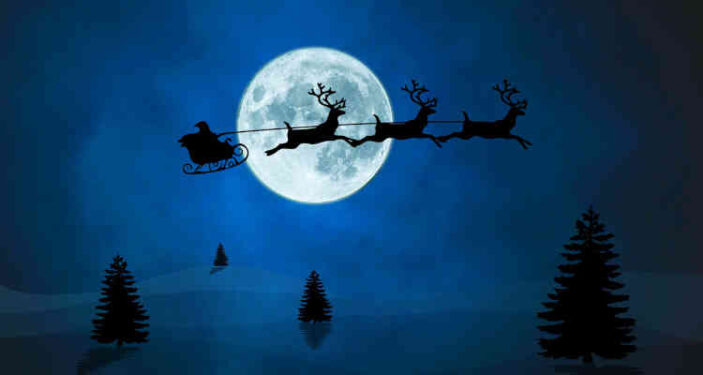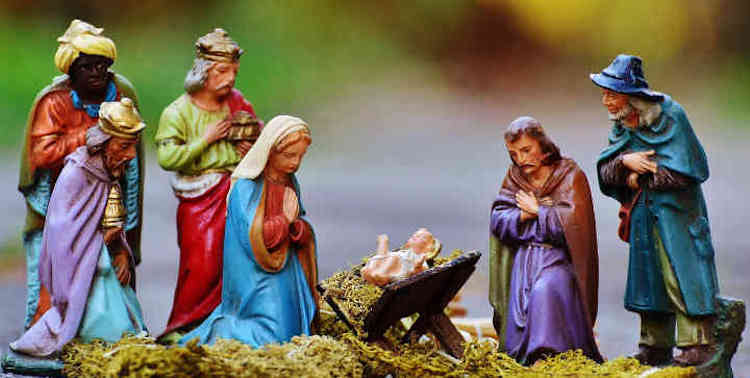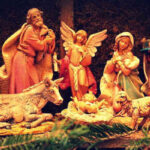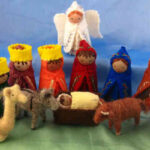The Christmas story is as old as time. We’ve heard it a hundred times, we’ve seen it, we’ve sung it.
But how well do we know it really? Test yourself against these twelve questions.
The questions
Test yourself with these questions, then scroll down to see how well you went.
- Jesus was not actually born on December 24th or December 25th. True or false?
- The date of Christmas was originally a pagan festival. True or false?
- Jesus was born in a stable because there was no room in the inn. True or false?
- Mary rode on a donkey on the journey to Bethlehem. True or false?
- Mary was heavily pregnant when she travelled and arrived just in time to give birth. True or false?
- The wise men in Matthew’s gospel were actually astrologers. True or false?
- There were three of these wise men, named Melchior, Balthazar and Jasper. True or false?
- Jesus was Mary & Joseph’s only child. True or false?
- The story of Santa Claus is based on a real person. True or false?
- Giving presents at Christmas is a long christian tradition based on the wise men’s gifts. True or false?
- Santa wears red clothes because Coca Cola gave him that colour in an advertisement. True or false?
- It is wrong to sully the Christmas story with politics. True or false?

The answers according to history
I’ve taken these answers from historians and as reliable sources as I can find.
1. Jesus was not actually born on December 24th or December 25th. True or false?
This is almost certainly true. No-one knows for sure when Jesus was born, but experts say that it would have been too cold for sheep and shepherds to be outside during the night in December – they would have been indoors. The best guess is that Jesus was born in September or October, although some suggest it was Spring (March-May). The first christians weren’t apparently interested in Jesus’ birthday, and it wasn’t until the third century that anyone suggested December 25.
2. The date of Christmas was originally a pagan festival. True or false?
This is completely false. Some sceptics have said that the Roman feast of Saturnalia was celebrated on December 25 because that was the winter solstice. However Saturnalia was actually celebrated earlier in December and it wasn’t a winter solstice festival. It began as a celebration of the agricultural god Saturnus, and it became a time of feasting, drinking and games somewhat like modern Mardi Gras, and a time when established norms could be broken.
There WAS a Roman winter solstice festival, Brumalia, but it was a minor festival (ancient people apparently didn’t have much interest in the winter solstice) and it was post christian. In the 4th century, a holiday Dies Natalis Solis Invicti (meaning “Birthday of the Unconquered Sun.”) was celebrated, but it seems most likely that the date of 25 December was chosen after the Christians had begun to celebrate that date themselves.
The earliest guesses about December 25 come from theological “calculations”, based on the perception that Jesus was conceived in the same date that God created the world, March 25, and December is 9 months later.
3. Jesus was born in a stable because there was no room in the inn. True or false?
This too is false, based on a wrong translation of the story in Luke’s gospel. The word once translated as “inn” simply means “a place to stay”, and in this case probably meant a guest room.
So perhaps the story is that Joseph brought Mary to his family home in Bethlehem, where they would have been treated as honoured guests and accommodated in the family guest room. However this room would have been too small when the time came to give birth, with several women acting as midwives, so they moved out into a larger room. Such a room would have been divided into two, with humans in one half and animals in the other half on cold nights. (This practice continued into medieval times in England.)
4. Mary rode on a donkey on the journey to Bethlehem. True or false?
This is uncertain. The Bible doesn’t mention it but donkeys were a popular means of transportation so it is possible. But walking or travelling in a cart pulled by a donkey are equally possible.
5. Mary was heavily pregnant when she travelled and arrived just in time to give birth. True or false?
This is very doubtful, though it makes for stirring reading. Luke’s gospel says (2:6): “While they were there, the time came for the baby to be born”. This suggests it was some time after they arrived that Mary went into labour.
6. The wise men in Matthew’s gospel were actually astrologers. True or false?
This is likely true. The word used, “Magi”, derives from the Persian priestly caste of Zoroastrianism. These priests studied the stars, and Matthew tells that it was seeing a particular star that led them to start their journey. The term “magi” is the source of our word “magic”, and had occult connotations to Jews and Christians. In the book of Acts, the word is twice translated as “sorcerer” (Acts 8 & 13).
Many scholars believe the story of the Magi is legendary, but whether historically accurate or not, the Magi probably were astrologers, and they probably were “wise men”.
7. There were three of these wise men, named Melchior, Balthazar and Jasper. True or false?
This also isn’t stated in the Bible. All it says is that they offered three gifts (gold, frankincense and myrrh), and from this tradition has inferred that there were three of them. We have no idea about their names, or even which country they came from.
8. Jesus was Mary & Joseph’s only child. True or false?
The Bible (both Matthew’s and Luke’s gospels) say Mary was still a virgin when Jesus was conceived miraculously. Many christians believe that Mary remained a virgin, but this is a matter of faith for there isn’t any historical evidence in the records we have.
It is quite clear from the gospels that Jesus had brothers and sisters (e.g. Mark 6:3). Some christians believe these were half brothers and sisters from a previous marriage of Joseph’s, but there is no evidence for this in the gospels. What we do know is that (1) Matthew says (1:25) that Joseph “did not consummate their marriage until she gave birth to a son”, inferring that they did have sex after that, and (2) Joseph was reported to still be alive 12 years later (Luke 2:41-48) so there was plenty of time for them to have had several more children.
9. The story of Santa Claus is based on a real person. True or false?
This is probably true. Saint Nikolaos of Myra appears to have been a real bishop who lived about 270-343 CE. Many legends grew up around him after his death and historians find it difficult to separate fact from legend.
He was said to be wealthy, but determined to follow Jesus’s teachings on wealth, he resolved to give away his fortune. Among other things, he was able to save three poor sisters from prostitution by anonymously throwing three bags of gold in their window at night. You can see how the Santa story could grow from that. There were also stories of miracles he performed.
The feast day of St Nicholas was celebrated in Western Europe on December 5 or 6. In the 17th century, the English started to call him Father Christmas and moved the celebration to December 25. Meanwhile the Dutch version of Saint Nicholas became known as Sinterklaas, a corruption of Sint-Nicolaas, the name eventially becoming Santa Claus when Dutch immigrants settled in America in the 17th century. It was only in the 19th century in the US that Santa began to be depicted in a sleigh pulled by reindeer.
10. Giving presents at Christmas is a long christian tradition based on the wise men’s gifts. True or false?
While many associate Christmas gift-giving with the Magi, historians are more doubtful. It appears from historical sources that gift-giving only became part of Christmas tradition in the 16th century in Western Europe, and the gifts were fairly token. In the middle of the 19th century in the US, the idea of Santa’s elves making toys for him to put in children’s stockings was invented. Gifts have gradually become more extravgent in first world countries since then.
It turns out that most of our modern Christmas traditions come from the US in the 19th century.
11. Santa wears red clothes because Coca Cola gave him that colour in an advertisement. True or false?
This is false. The Coca Cola company depicted Santa wearing a red coat in advertisements around 1930, but he was portrayed in red as early as 1821, and this become common several decades before Cocoa Cola showed him in red.
12. It is wrong to sully the Christmas story with politics. True or false?
Clearly this isn’t a factual matter but a matter of opinion. But there are many who feelthat Christmas is one day of the year when we should forget politics and focus on the lovely story of the child born in a manger. Especially at family dinners where a variety of political views may lead to arguments.
However Christmas has always been deeply political.
- In the Roman Empire around the time of Jesus’ birth, the Emperor was considered to be divine, the Lord, the bringer of peace. So when Luke writes of Jesus as “son of God” (1:35) who will reign over an endless kingdom (1:32-33),he was making a deeply political statement.
- In Luke 1:53 Mary is quoted as saying “He has filled the hungry with good things but has sent the rich away empty.”, which sounds almost Marxist.
- These themes of Jesus, not Caesar, as Lord (1 Corinthians 12:3), the kingdom of God (Mark 1:14-15) and God’s preference for the poor over the rich (James 5:1-6) are taken up in other places in the New Testament
So while it is best to avoid political arguments on Christmas Day (and any other day perhaps), Jesus’ coming had strong political implications which we shouldn’t shy away from.
How did you go?
Did anything surprise you? (Feel free to let me know in the comments.)
This was mostly a bit of fun. But if there is any take-home message, it is that 21st century Christmas celebrations probably owe more to legend and tradition than to fact.
The reality of Jesus is harder-edged than we often allow him to be.
I hope you have a happy and safe holiday time, whether you celebrate Christmas, Hanukkah, Diwali, the winter solstice or even Saturnalia, or nothing.
Graphics: Pixabay and Pixabay.





Interesting facts. I didn’t do very well I’m afraid !
Anyway, a Happy Christmas to you and your family and all your readers.
Hi Eric,
Is the book of James in the New Testament written by the brother of Jesus?
Kind regards, Ryan 🙂
“Interesting facts. I didn’t do very well I’m afraid !
Anyway, a Happy Christmas to you and your family and all your readers.”
Ah well, think how much better you’ll be at your next Xmas trivia!! (You mean you don’t do Xmas trivia!!??) 🙂
Thanks, and best wishes to you too. Hope it is just the right temperature and humidity for you west of the divide.
“Is the book of James in the New Testament written by the brother of Jesus?”
Generally considered to be. Some scholars think it is written by someone else in James’ name, but I don’t see why. It is interesting that the book is much more about behaviour than belief, and quite politically radical at the end (ch 5). Perhaps that was how the family was raised.